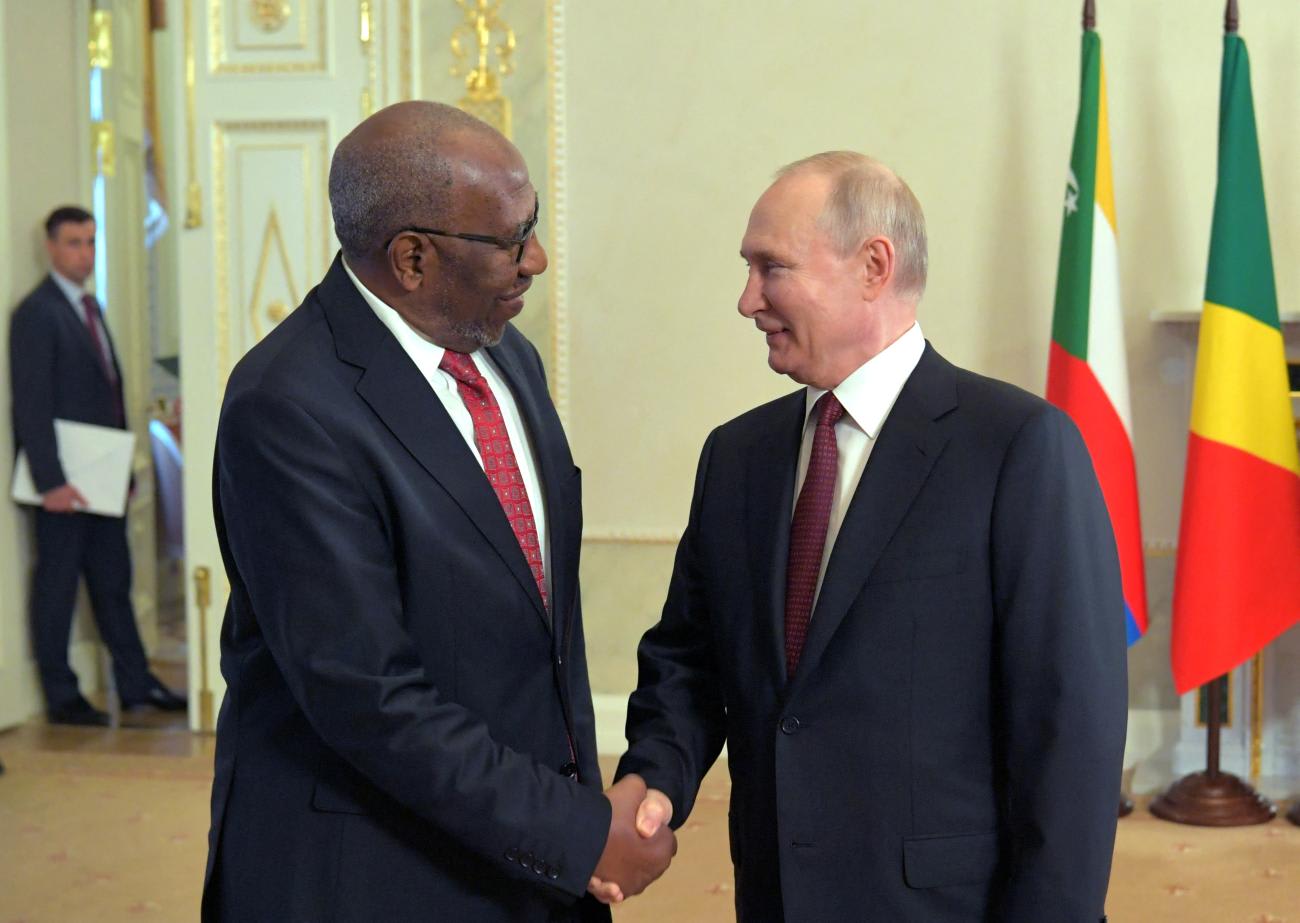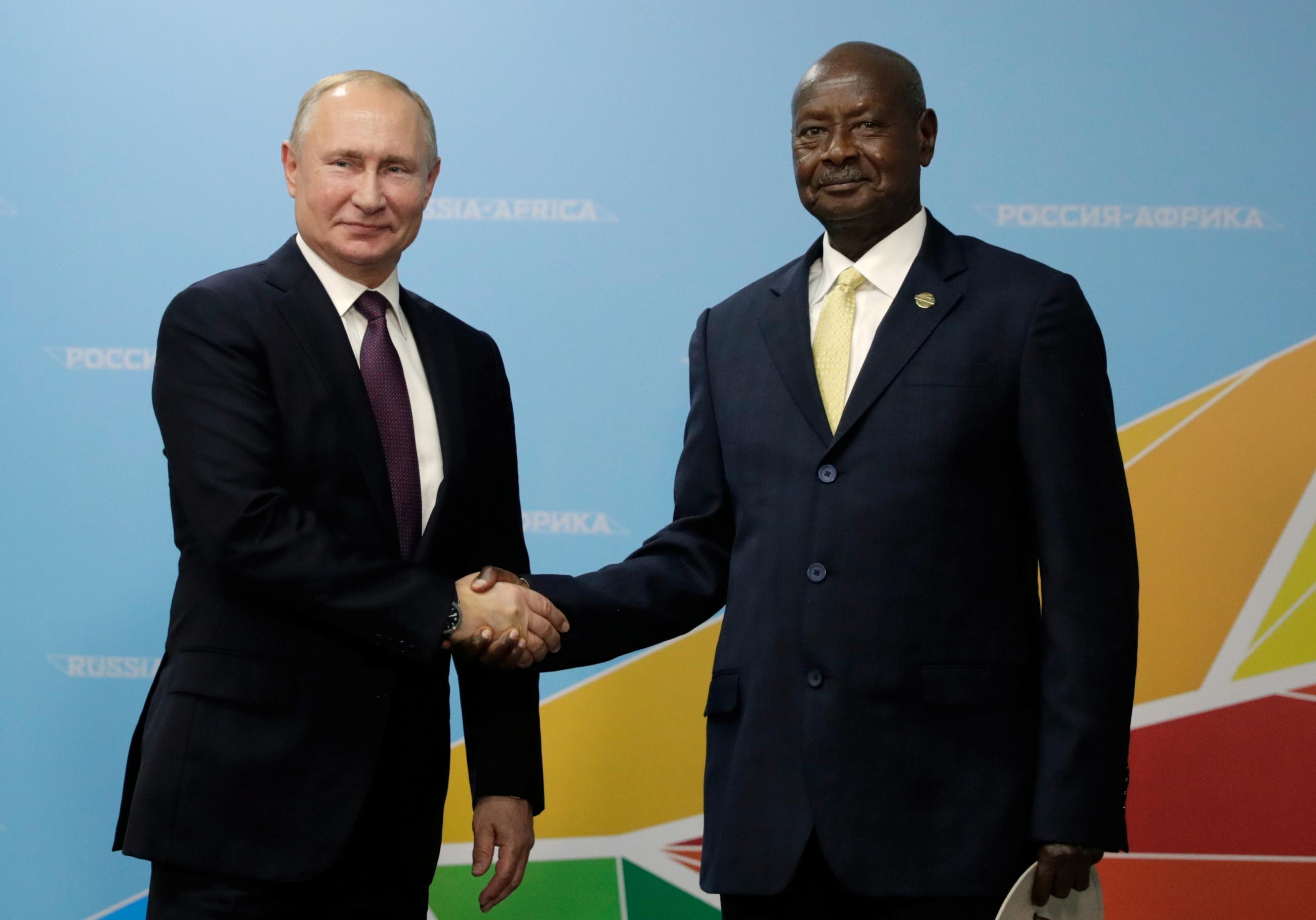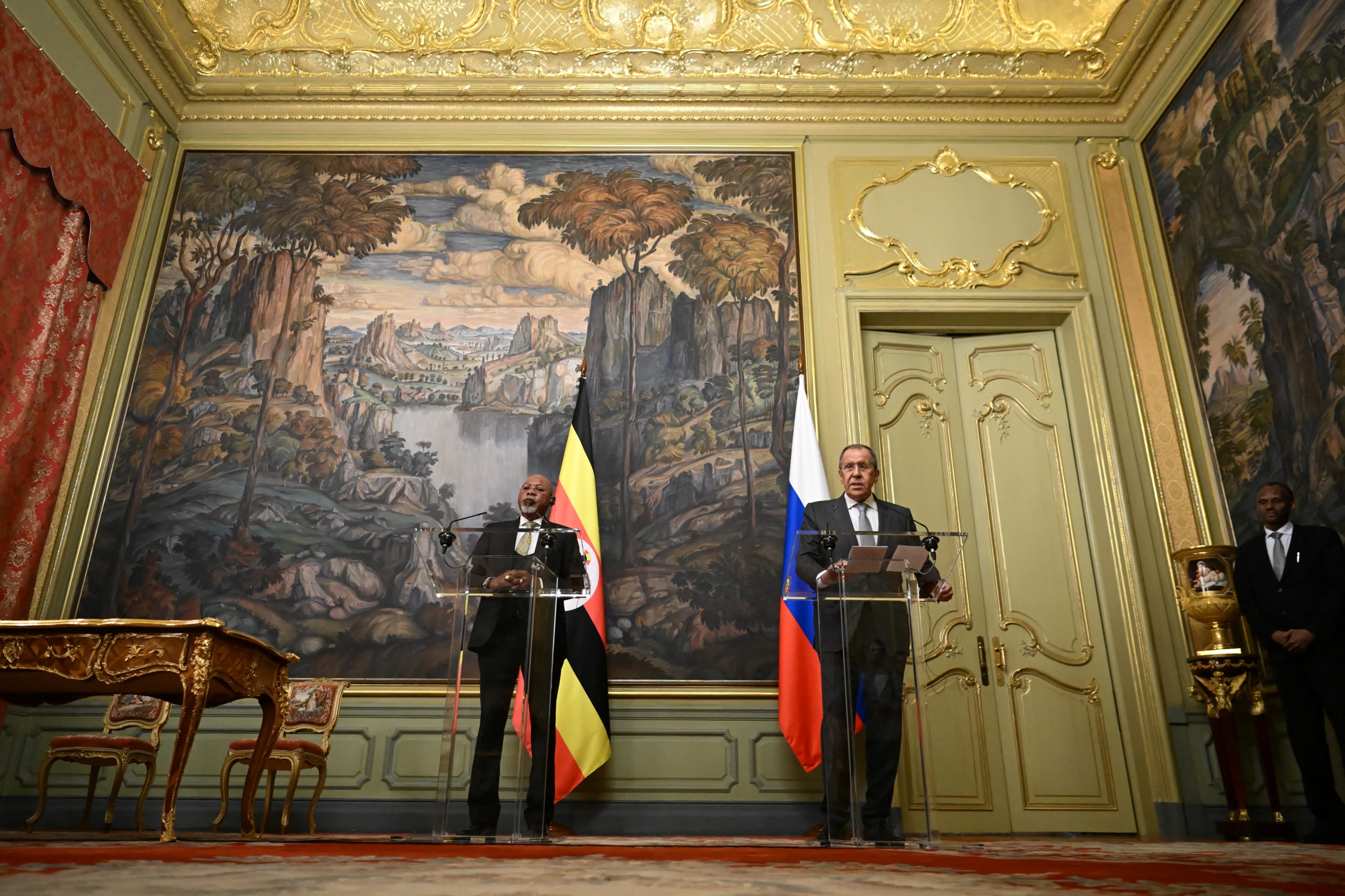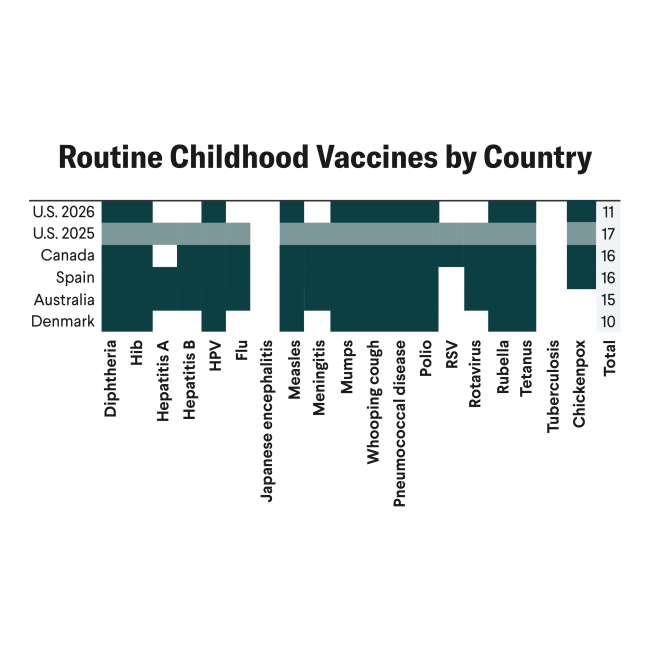In recent years, Russia's role in Africa has involved more engagement and expansion of its diplomatic reach. That trajectory contrasts with the adversarial relations between Russia and Western countries, heightened by its invasions of Crimea in 2014 and Ukraine in 2022. African countries are increasingly sympathetic toward Russia. For example, a sizable number of them abstained or were absent during the UN vote to condemn Russia's invasion of Ukraine.
The intensifying relations between Russia and African countries include increased cooperation on health issues. At the forefront of that development is the health collaboration under way between Uganda and Russia. Although focused on biosecurity challenges exposed by the COVID-19 pandemic, the bilateral health activities reveal Ugandan and Russian interests that extend beyond the health sector to include economic efforts and touch on regional leadership in Africa and global competition among the great powers.
Ugandan-Russian health cooperation provides a lens on how global health is changing in the post-pandemic geopolitical world.
Bilateral Relations Between Russia and Uganda
Russia's activities in Africa span political, economic, cultural, and social sectors. For Uganda, traditionally seen as a strong ally of the West, Russian diplomacy includes health initiatives, an area in which Western nations have long dominated.
The Uganda-Russia Joint Permanent Commission governs their bilateral relations, covering several policy and programmatic areas, including agriculture, education, energy (oil, gas, and nuclear), information technology, military, and technical cooperation—with an emphasis on training personnel. On the economic front, an agreement on the protection and promotion of investment covers Russian investments in Uganda. Russia's health activities in Uganda include supporting the health workforce and developing Ugandan capacities for biosecurity, pandemic response, and surveillance.
A recent Russia-Africa health summit convened in Uganda epitomizes the development of the Kremlin's efforts toward Uganda's and Africa's pandemic preparedness. Russia has provided high-tech mobile laboratories to support disease surveillance and outbreak investigations in Uganda. Equipped with a polymerase chain reaction machine, the mobile laboratories carry out investigations at the point of service and minimize the diagnostic turnaround time. The two countries signed a roadmap for cooperation with timelines for meeting biosafety and biosecurity goals while emphasizing biological sovereignty.
Russia's Motives
In the past, Russia showed little interest in Ugandan or African health beyond offering scholarships for university training through educational and cultural exchanges. Conversely, the United States and Western democracies have offered long-standing health initiatives, including the President's Emergency Plan for AIDS Relief (PEPFAR) and the Global Fund to Fight AIDS, Tuberculosis, and Malaria (Global Fund). Russia's health maneuvers with Uganda indicate that Moscow now considers such cooperation important for several reasons.
Ugandan-Russian health cooperation provides a lens on how global health is changing in the post-pandemic geopolitical world
As its relations with the Western powers have deteriorated, Russia has sought to improve and legitimize its geopolitical standing across Africa. Two Russia-Africa summits have been held, the inaugural one in Sochi in 2019 under the theme "for peace, security and development." The 2023 Russia-Africa summit in St. Petersburg reiterated Russia's commitment to Africa's development.
Through such efforts, Russia wants to create a multipolar world order that ends the hegemony of Western countries. It also seeks to bypass Western sanctions imposed after the invasion of Ukraine by expanding political, military, and economic relations with other countries. Efforts to improve ties with African nations help the Kremlin counter Western accusations that Russia causes political instability on the continent and exploits African resources.
Further, Russia views its renewed interests in Africa as a continuation of Soviet-era historical linkages with the continent's struggle for independence and post-independence state-building. During the second Russia-Africa summit in 2023, Russian President Vladimir Putin noted that lingering colonial legacies contribute to political instability and economic stagnation in Africa. Russian officials have also reiterated sentiments from Ugandan President Yoweri Museveni against the neocolonial tendencies of the Western powers.
Health diplomacy provides Russia with ways to demonstrate its commitment to Africa countries, support African efforts to exercise the right of self-determination and strengthen national sovereignty, and increase Russian presence and influence on the continent. The COVID-19 pandemic witnessed, among other things, the controversy over the origins of the coronavirus in China, the securitization of global health, and vaccine nationalism, which cemented cooperation among some countries and opened old diplomatic wounds between others.
COVID-19 opened new channels for Russian health diplomacy by raising the importance of health, particularly biosecurity and surveillance, in global politics and the foreign policy interests of many countries. In that context, Russia's investment in Uganda's laboratory infrastructure and capabilities can be viewed as more than an altruistic act to improve the Ugandan health-care system. The investment provides Russia with an opportunity to engage with Uganda on harvesting and tracking microorganisms suspected of being potential biological warfare agents and boosting research on strengthening biosecurity surveillance nationally, regionally, and globally.
Similarly, memoranda of understanding and collaborative agreements between Russia and Uganda aim to boost the latter's agricultural production. Those arrangements start with joint efforts by soil science researchers at universities in both countries that could, over time, deepen Russian involvement in Uganda and Africa.
In health diplomacy, Russia is playing catch-up in Africa with the United States and other Western nations, which have worked with African countries on health challenges for decades. That work includes well-established activities under PEPFAR and the Global Fund, epidemiology fellowships programs, collaboration with the South African Medical Research Council, and support for the Uganda Virus Research Institute.
That history of Western predominance is what makes Russian health cooperation with Uganda, a long-standing partner of Western countries, a big scoop for Moscow. Over the years and through different governmental regimes, Uganda has positioned itself as a model for development, as reflected in global development trajectories. The country's education system has seen exemplary regional performance since independence. Many regional peers turn to Uganda for benchmarking on development. Uganda also embraced the structural adjustment programs used by the World Bank and International Monetary Fund in the late 1980s and 1990s, which boosted Western perceptions that Uganda's approach to development was worth emulating.

Uganda is also a strategic target for Russia because it plays a major role in the Non-Aligned Movement (NAM). The return of geopolitical competition between the United States, China, and Russia has rejuvenated the NAM as those two rival powers scramble for influence among NAM members. In January 2024, Uganda took leadership of the NAM for two years.
Finally, President Museveni is a prominent African statesman who is a strong advocate for regional integration and cooperation, often describing himself as a pan-Africanist. For Russia, courting such a seasoned senior leader provides an entry point into other African countries. Russian health investments in Uganda align with Museveni's ambitions for advancing African development and integration.
Uganda's Motivations
Unlike Venezuela and other countries, Uganda has not been in ideological proximity with Russia. In the new geopolitical scramble for Africa, Russia's embrace of anticolonial rhetoric would appear shallow and opportunistic. Its invasion of Ukraine violated principles that African countries have defended for decades, such as not changing international borders by force. That context makes understanding what Uganda wants from health cooperation with Russia important.
In addition to being a model of economic development, Uganda and Museveni have shown leadership in the fight against HIV/AIDS. Many global HIV/AIDS strategies and policies have origins in research and lessons learned in Uganda. As a result, Uganda has enjoyed a prominent position in global health diplomacy.
The country has been recognized for its progressive policies on providing health and humanitarian support for refugees and internally displaced persons. In addition, the Ugandan government has contributed to peacekeeping missions in the region as part of its impressive performance in the global war against terrorist threats. Those and other accomplishments have given Uganda the political standing, capabilities, and confidence in foreign affairs, including engaging cooperation with new partners, such as Russia.
Uganda also has an outstanding reputation fighting other epidemics in Africa. Kampala's support during the Ebola crisis in West Africa in 2014 sets a good example for South-to-South technical collaboration. Located in a region of frequent outbreaks, Uganda has built capacities that have fended off threats from cholera, Crimean-Congo hemorrhagic fever, Ebola, Marburg, measles, and yellow fever. The country's effective response to COVID-19 also contrasted with the struggles many high-income countries had during the pandemic.
These and other Ugandan successes help explain why Kampala hosted the recent Russia-Africa Health Summit. Russian support enhances Uganda's capabilities and sharpens its competitive edge in health diplomacy across Africa.
Uganda's interest in new diplomatic partners has coincided with Western countries' intensified criticism of Museveni's regime over the perceived deteriorating protection of human rights. Uganda was lauded as an emerging democracy, and Museveni was praised as part of a "new breed of African leaders" as the nation broke free from the shackles of autocratic regimes that swept across the continent in the 1970s and 1980s.
Over time, however, Western countries have increasingly called Museveni's government, which has ruled Uganda since 1986, undemocratic and have expressed concerns about the repression of political dissent undertaken as part of the regime's quest for survival. The passage of the Anti-Homosexuality Act 2023 brought Uganda into direct confrontation with Western allies over human rights.
Uganda's health cooperation with Russia reveals changes in Ugandan politics, African regionalism, global health policies, and geopolitics
In the face of Western pressure, cooperating with Russia over health and other policies offers the Ugandan government an alternative ally. Engaging with Russia on health provides a way for Uganda to weaken the hegemony of Western donors. Museveni has identified the need to reduce political and economic dependence on Western powers. International responses to COVID-19, especially on sharing vaccines, underscored that African public health is vulnerable to the self-interests of Western countries. Collaborating with Russia on health gives Uganda bargaining leverage in its dealings with Western governments.
That leverage includes emphasizing that Russian health assistance comes with fewer strings attached than Western aid. Uganda and other recipients of health and development assistance increasingly consider conditionalities on aid to be a form of neocolonialism. Russia always underscores its policy of noninterference in the national politics of African countries. Museveni has not shied away from highlighting that Russian policy as a driving factor in his cooperation with Moscow.
Finally, Uganda has benefited from Russian support in other diplomatic forums. During Uganda's two-year presidency of the UN Security Council, Russia backed all the motions that Uganda proposed. Uganda has reciprocated, most recently by not participating in a conference in Ukraine despite Ukrainian efforts to persuade Museveni to attend.
Navigating New Realities
Uganda's health cooperation with Russia reveals changes in Ugandan politics, African regionalism, global health policies, and geopolitics. Those changes have created opportunities for bilateral health collaboration that helps Ugandan health and supports a range of regional and global interests that Kampala and Moscow have.
Long the dominant players in health diplomacy, Western countries are realizing that their immense health investments in Uganda and Africa are not producing meaningful influence in the new geopolitical world. They are scrambling to reset their relations with African countries to counter the resurgence of Russian activities on the continent.
Those new realities, however, are not set in stone. Russian health assistance might not improve health in Uganda. Ugandan and Russian interests on health and other issues might fall out of alignment. Western countries might recover their footing in Africa and compete more effectively with Russia across the continent.
What is clear is that the emergence of Ugandan and Russian health cooperation helps illuminate how much the geopolitical calculations of the great powers and nonaligned nations are reshaping health diplomacy and global health politics.

EDITOR'S NOTE: This article is part of a series exploring Russia's foreign policy on global health guest edited by Nataliya Shok. The rest of the articles in the series can be found here.












